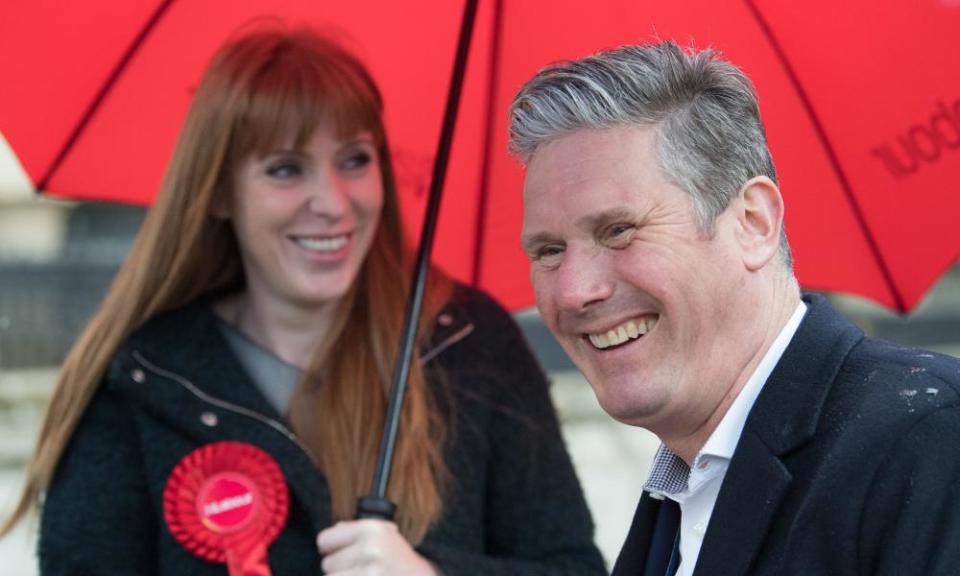With Rayner’s reshuffle, Starmer has destabilised his base within Labour

Keir Starmer picked a fight with his deputy Angela Rayner last weekend and lost. He sacked her as party chair and national campaign coordinator on Saturday, when the election results were still rolling in – and some of them deserved to be celebrated, unlike the wounding defeats that had emerged until that point. The timing was poor, with many wondering why the leader would not wait for the full electoral picture to be known first. The politics was controversial, too, as Rayner – despite her title – did not oversee the campaign, yet it looked like she was being blamed for the result. The word “scapegoat” cropped up everywhere, though Starmer maintains that he takes “full responsibility”. In the minds of some Labour MPs, the mishandling of the situation confirmed their fears about the leader’s political inexperience.
When elected as Labour leader last year, Keir Starmer appointed a shadow cabinet of those perceived to be the “quietly competent” of the parliamentary party. Starmer was shaping the top team in his own image: it was largely made up of those who had kept their heads down during the Jeremy Corbyn years, perhaps grumbling to sympathetic colleagues and local party members but not making their complaints heard publicly. Nick Thomas-Symonds, John Healey, Jonathan Ashworth and others promoted had all served on Corbyn’s frontbench, like the new leader.
Starmer’s shadow cabinet aligned with the party unity theme of his leadership campaign. His choice of shadow chancellor, Anneliese Dodds, was the best example of that. It was only on the next rank down, among junior shadow ministers, that those too politically divergent from Corbyn to have ever left the backbenches in recent years could be found, such as Liz Kendall, and vocal critics of Starmer’s predecessor, such as Wes Streeting and Jess Phillips. This was a clear indication that the future direction of the party may not be as soft left as the shadow cabinet suggested, with these MPs set to secure more senior jobs in time.
The Corbynite left of the party was disappointed by their being left out in the cold, as one might expect. But the right of the parliamentary party was also frustrated. While some of their factional figureheads, including Progress chair Alison McGovern, had been included on the frontbench, they had been hoping for “big hitters” such as Yvette Cooper and Hilary Benn to be offered top jobs. Ever since Starmer became leader, they have been tipped for big promotions. It is baffling to many that those old hands have not been brought back to offer heft to the anonymous frontbench.
This is the context in which Starmer reacted to the Hartlepool byelection thrashing, the heavy Tees Valley mayoral defeat and the poor council results in England by removing titles from the deputy leader. It was politically dicey, causing concern to the centre of the parliamentary party that had backed both Starmer and Rayner. (A “knee-jerk response” showing “the wrong lessons are being taken”, one frontbencher texted that night.) It was also politically clumsy: Rayner has her own mandate and cannot be booted out of the shadow cabinet or the all-important ruling body. She has been described as “an unstoppable force and an immovable object” in one. Reshuffling her requires a great deal of care, if the leader does not want tensions to erupt.
Rayner is admired by party insiders as a canny political operator. Without a family steeped in the labour movement to help, she worked her way up through Unison to get where she is today, whereas Starmer entered the political fray only when he became an MP in 2015. It is no surprise that the leader’s high-risk move led to long negotiations, talk of a leadership challenge and ultimately Rayner securing jobs that – unlike the party chair role – are actually well-defined, with responsibilities over policy.
As shadow chancellor of the Duchy of Lancaster, Rayner will step into a post that Rachel Reeves – replacing Anneliese Dodds as shadow chancellor – had expanded, not only shadowing Michael Gove but also taking ownership of projects such as attacking “Tory cronyism”. As shadow secretary of state for the future of work, she will work with the last Corbynite standing, Andy McDonald, on policies around good, well-paid jobs. “She saved Andy’s job because we’re not going to let Peter Mandelson destroy the link between Labour and the unions,” one ally said. (The New Labour spin doctor has rejected claims he wants the union link axed.)
Starmer’s decision to destabilise his base within the party, its middle, with the badly timed and executed Rayner sacking was ill-advised. But it is the way this reflects on competence, more than factionalism, that has most MPs worried. This was a key promise of Starmer’s leadership pitch. Many can forgive abandoning party unity if professionalism and electability are delivered instead, just as alleged “control freakery” from the leader’s office can be ignored if it is done in the name of bright decision-making and shrewd manoeuvres.
With more evidence of poor political management emerging over the weekend, it was remarked by a number of party insiders that the leader’s office needed a reshuffle more than the shadow cabinet did. Campaign group Open Labour made this comment publicly; others only via WhatsApp. “Keir is going to have his work cut out to not end up being our IDS,” one frontbencher told me when the chaos had died down. The comparison to an opposition leader ousted by a no-confidence vote is, well, hardly a vote of confidence. The reshuffle row has been patched up, but there are underlying problems still to be addressed by the Labour leader.
Sienna Rodgers is the editor of LabourList

 Yahoo News
Yahoo News 